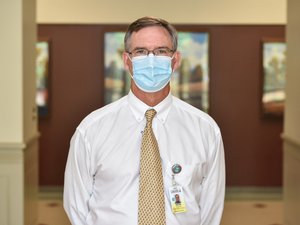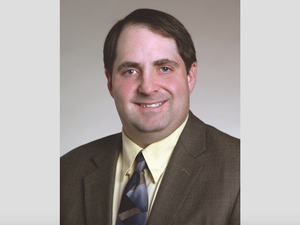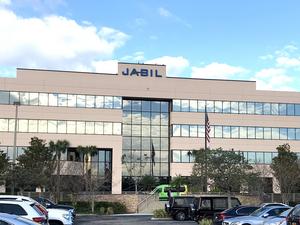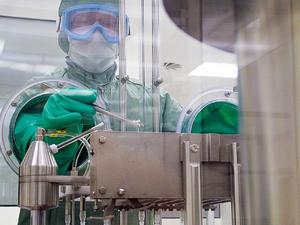As the global pandemic shut down much of the metro in March, members of the local startup ecosystem set about tackling a crucial coronavirus conundrum: How to prolong the lifespan of N95 masks, which are critical items of personal protective equipment (PPE) but in short supply.
The Memphis PPE Initiative was formed to produce reusable PPE for health care, where a mask can be placed over an N95 then sterilized or used alone with an internal custom filter.
The core of the team tackling this problem traces back to connections made at Memphis’ ZeroTo510 medical device accelerator.
A few months and many design iterations and refinements later, the initiative’s N95 innovations may prove to play a critical role in protecting health care workers in the short- and long-term fight against COVID-19.
Team assembly
Only days after the City of Memphis declared a civil emergency in March, Regina Whitley, executive director of the Greater Memphis IT Council, called Ryan Ramkhelawan — a Memphis-based entrepreneur.
Whitley wanted to discuss leveraging Ramkhelawan’s contacts to source personal protective equipment (PPE) for use in the metro.
That initial inquiry morphed into a team approach that uses Memphis’ core competency in medical device development to create a new sustainable, scalable PPE solution for an unprecedented health care crisis.
Whitley and Ramkhelawan have known each other for nearly a decade. In 2012, Whitley was VP of marketing and communications for the Memphis Bioworks Foundation, and she helped recruit Ramkhelawan’s company, Restore Medical Solutions, to participate in the inaugural ZeroTo510 medical device accelerator.
Ramkhelawan cofounded Restore and is currently the founder of another medical device firm, CleanEndo. He also serves as director of acceleration at Start Co.
A few days after the March call, he reached out to the Memphis innovation community and formed a task force — including fellow ZeroTo510 alum — with the idea of making an entirely new type of PPE mask.
In addition to Whitley and Ramkhelawan, key members of the Memphis PPE Initiative’s task force include Josh Herwig, cofounder and chief technology officer of SOMAVAC Medical Solutions; Claudio Donndelinger, emerging technology research specialist at the FedEx Institute of Technology at the University of Memphis; and Axel Strömbergsson, COO of SweetBio.
Within a few days, the task force figured out what needed to be done on the regulatory side and began making simple prototypes.
What differentiated the Memphis PPE group from other similar projects was melding regulatory requirements into a design to go beyond some of the more rudimentary stop-gap products being made locally and nationally.
“[The] things that are out there, like 3D printed masks and shields, are very limited in functionality. … If you don’t understand how the FDA stuff works, it’s difficult to navigate. [But], that’s what we do,” Ramkhelawan said.
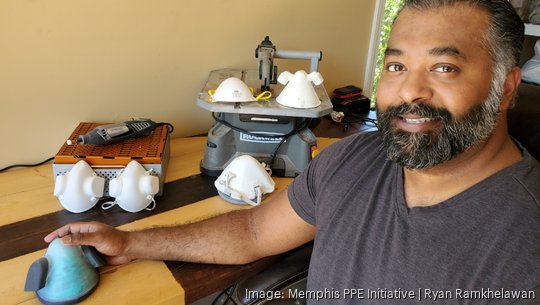
Prototype to printed
Ramkhelawan made the initial prototype in his shop using an oil funnel, fiberglass, and sprinkler parts.
The design mimics backward-facing vents meant for inhaling and exhaling behind the wearer. The mock-up was to show the group his basic idea for the mask.
His second prototype iteration was molded fiberglass that fit over an N95 mask and included internal channels for the backward vents.
From there, Ramkhelawan met with Herwig — a biomedical engineer proficient in computer-aided design (CAD) — to enlist his help to translate the prototype into something manufacturable. The two had stayed in touch after SOMAVAC went through ZeroTo510 in 2016.
They met up at midday on a Sunday in April, and by midnight Herwig had a CAD-generated prototype in process on his own 3D printer.
Needing a more advanced option, the 3D printer at the FedEx Institute of Technology became a hub for producing refined prototypes. Herwig would send CAD designs to Donndelinger, who would then send a prototype back for further improvements.
Donndelinger is also a member of Mid-South Makers, which has used 3D printers to produce face shields for local health care workers during the pandemic.
“We moved relatively quickly on this. In the first couple weeks, we had the [mask] through five or so physical iterations to start getting end-user feedback to make sure we were on the right path and going to be beneficial,” Herwig said.
The task force connected via Zoom or Google Hangouts once or twice a week. Design review virtual meetings would be held with Ramkhelawan, Herwig, Donndelinger, and Strömbergsson to go over the latest prototype.
Strömbergsson is also as an engineer with years of work in medical devices. He reviewed FDA regulations and provided guidance on the mask design — advice that led prototypes toward a low-cost end product that could be easily manufactured at scale.
“We started looking into this more and understanding the actual need may be much larger than what we [thought] feasible from a 3D printing perspective,” Strömbergsson said. “That’s when we started [to say], ‘3D printing may not be the ultimate solution [for this].’”
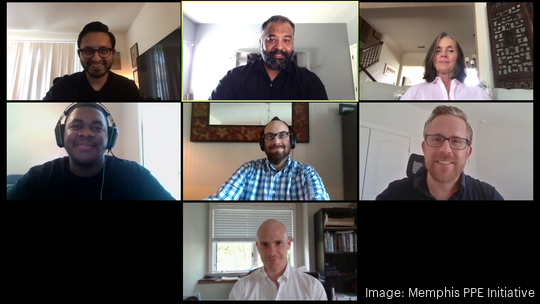
Manufacture at scale
The coronavirus waned after the initial shutdown but has returned in force this summer in Memphis. As hospitalizations have risen, the need for PPE became readily apparent again.
To produce N95 mask covers at a rate needed to assist potential PPE shortages, the Memphis PPE Initiative focused on manufacturing via injection molds.
In May, the local technical trade school Moore Tech jumped on board and made a temporary injection mold for the purpose of creating small runs of product.
The initial goal of the project is to provide needed PPE for Memphis. But, the broader aim is to have an impact beyond the metro. The PPE designs will be available to other communities, and any sale proceeds will go back into producing more PPE.
“It’s almost like a philanthropic fund that just feeds itself to be sustainable,” Ramkhelawan said.
To that end, relying on 3D printing for masks would depend on a community’s number and access to those printers even with the Memphis PPE Initiative’s design. And, masks would take weeks to print in sizable numbers.
Likewise, 3D printers also limit the materials that can be used. With injection molding, using FDA-grade silicone is possible so a production run could make “thousands and thousands” at once, Ramkhelawan said. The initiative has vetted regional manufacturing firms capable of mass producing their design once it is finalized.
Strömbergsson said he viewed the PPE project as a two-stage rocket: It first addressed the acute need for PPE with a N95 mask cover, and the second stage deals with filter cartridges that can be placed in the masks they produce. The second part will require going through the FDA’s 510K approval process.
“This could be an evolution in the type of masks health care professionals have for future pandemics,” Strömbergsson said. “You can [sterilize] it in an autoclave … and have tens of thousands of filter cartridges in storage in the hospital.”
The PPE Initiative’s filter cartridges could provide N95 filtration or filter out particles on a construction site, depending on that sector’s regulatory requirements.
The long-term potential for the mask is to have a variety of filter options that can be placed in its interior slots, filling filtration needs for health care, construction, or general public use.
“It’s scary right now. But, you know what’s more scary? What happens in the fall,” Ramkhelawan said. “We could’ve made a temporary [solution] or planned to do it in a scalable fashion. That’s the approach we took.”
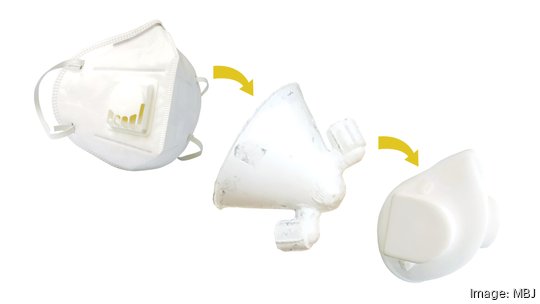
Feedback to production
Ramkhelawan estimated their project compressed the equivalent of a year of research and development (R&D) into about six weeks. And, in just over three months, they had a scalable product with a thought-out regulatory strategy.
But, a key aspect — possibly the key aspect — of that R&D was end-user feedback. What is the point if the masks aren’t used?
Invariably as Ramkhelawan presented the mask prototype to doctors and nurses, he was asked one question: “How do you clean it?”
Explaining the material used to manufacture the masks quickly put the professionals at ease.
“[Medical grade silicone] manages all the modalities of sterilization that a hospital would typically have,” Ramkhelawan said.
He talked to more than two dozen health professionals in multiple states, gauging impressions of the prototype’s design. Feedback has been positive, with those intubating a patient or administering anesthesia finding the back-facing vents to be a clever solution.
Initially, the prototype included elastic straps, similar to those on an N95.
“We realized they are used to it, but they don’t like [the straps],” he said.
The latest prototypes have adjustable silicone straps that can be sterilized, too.
Now, the Memphis PPE Initiative has confirmed pilot test sites for its mask prototype, including a regional hospital and with independent clinicians — four in Memphis and one in Atlanta.
Sam Lynd, administrator and CEO at Jonesboro’s NEA Baptist Memorial Hospital, provided insight on the mask design and has taken an active role at Start Co. providing guidance to companies in its accelerator. His hospital will be a test site for the Memphis PPE Initiative’s mask prototype.
And since May, the Memphis PPE Initiative gained other new contributors.
PPE expert JA Rodriguez has provided strategic guidance through the project’s R&D process. He is director of strategic advancement at the Board of Certified Safety Professionals, and he is the father of SweetBio cofounders Kayla and Isaac Rodriguez.
Jerry West, senior prototype manufacturing manager at Wright Medical, gave fine-tuning advice. And, LITE Memphis funded a summer intern, Kendus Tisdale Jeffries, for the initiative.
Another connection to Ramkhelawan’s startup launch offered assistance remotely, from Silicon Valley.
Vidhan Agrawal befriended Ramkhelawan during the inaugural ZeroTo510 in 2012. He later worked with him at Restore and now is involved in the tech sector in San Francisco.
He credits Ramkhelawan’s unique ability to pull people together for the Memphis PPE Initiative’s existence and his own involvement in an advisory role.
As of late July, the mask is progressing to production. Moore Tech has made a low-volume production injection mold to produce 1,000 masks to test out the process and materials used. That test mold tooling cost about $40,000.
To date, members of the initiative have covered the cost of the R&D and the first small production batch. But, they are searching for grants and other funding sources for the high-volume production injection mold, which will be more expensive.
Price points for the mask will be based on the cost of production and needed operational funds to keep the initiative running.
The group has a quote from a regional company to do the first production run, but details haven’t been finalized. Once the main body of the mask is produced, batches of masks will be shipped to Memphis, where other components would be added.
A full production run that could produce 10,000 to 15,000 masks a month is possible even in the absence of outside funding. The masks would have a slightly higher cost to cover expenses.
While not entirely solving PPE supply issues, the Memphis PPE Initiative thinks its mask can help preserve critical supplies of N95. And, their initiative’s progress toward that goal illustrates the strength of having a robust entrepreneurial ecosystem in place.
Agrawal noted how the startup culture and economic engine in Silicon Valley was seeded in the 1950s and ’60s. Work done by Memphis organizations over the past decade created an emerging ecosystem here, he said.
“The team on this project speaks to the ancillary benefit of bringing people together — the ZeroTo510 and larger accelerator community — and investing in ideas and smart people,” Agrawal said. “Maybe not immediately, but when good people come together with good ideas, good things happen.”
